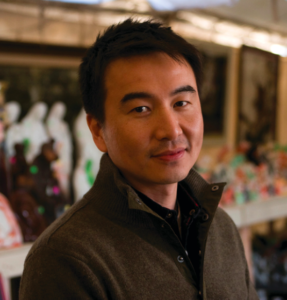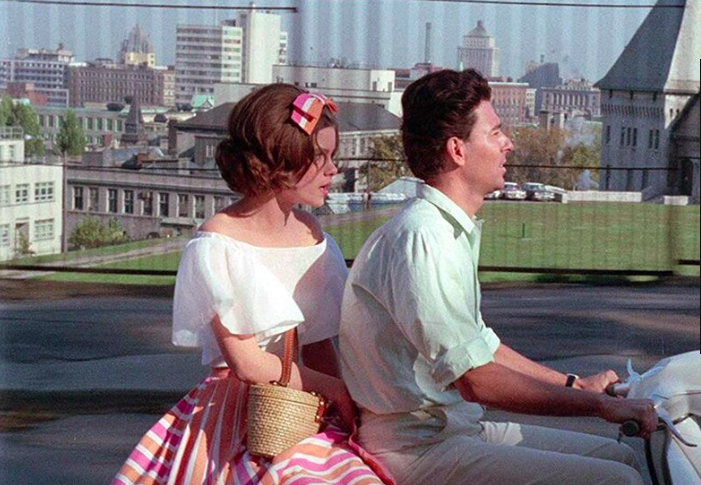Our Time machine is a film about fathers and sons and the power of memory. It follows one of China’s most important conceptual artists Maleonn as he tries to help his father cope with advancing Alzheimer’s. In his prime, Ma Ke, was the artistic director of Shanghai Chinese Opera Theatre. When Ma Ke is diagnosed, Maleonn created a work of art that he calls Papa’s Time Machine, an adventure told by human-sized puppets built around Maleonn’s own memories of time spent with his dad. The project was filmed by the director S. Leo Chiang. It won the documentary cinematography award at the Tribeca festival. Before the film is screened at the Wakefield Doc Fest, Feb. 29 and March 1 at 2 p.m., the director answered questions from ARTSFILE.
Q. S. Leo Chiang, please tell me about you.
A. I’m originally from Taiwan but moved to the U.S. as a teenager. Now I split my time between California and Taipei. I am a cinephile and have loved films all my life. I love storytelling, both on the receiving and giving sides. I have an undergraduate degree in electrical engineering but ended up at film school at age 25. I make documentaries because I love traveling, meeting people I have no business meeting and going to places I have no business being at. I love making immersive, observational, character-driven films that speak about the beauty and complexity of the human relationship. Although some of my films have social justice themes, I still very much approach them through the journeys of my characters.
Q. Tell me how you heard about this story?
A. I made Our Time Machine with my film partner Yang Sun, who is based in Shanghai. Yang was actually the one who initially met Maleonn, because he was hired to shoot a short profile documentary on Maleonn for a Chinese company that follows the TED Talk model of inviting influencers to speak. Maleonn shared a story about how his father kept asking him the same question over and over again, and how that motivated him to want to make a piece of work with and for his father. Yang was moved by the story and thought there was a longer piece and he invited me to collaborate with him. That was 2015. We finished the film at the beginning of 2019.

S. Leo Chiang
Q. Tell me a bit more about the story. What is it about?
A. Our Time Machine follows Maleonn, a Chinese conceptual artist, and his father Ma Ke, who is one of the first Peking Opera directors in contemporary China. After Ma Ke is diagnosed with Alzheimer’s, Maleonn sets out to work on a large scale theatre piece, performed entirely by human-size steampunk-style mechanical puppets, called Papa’s Time Machine. The theatre piece is about a Mad Scientist who builds a time machine so he can bring his father to their past to retrieve his memories. With this work, Maleonn wants an opportunity to finally collaborate with his father before Ma Ke is no longer able. Our film follows both the challenging process of putting together this ambitious art project, as well as the Ma family relationship as its patriarch gradually declines into Alzheimer’s.
For me, the film is about the impermanence of life, and how — in order to live fully — we should all embrace and celebrate how time is fleeting. Celebrate our mortality, and find beauty in it. The film is also a love letter to art-making, which is illogical, all-consuming, and hopelessly unavoidable for those who walk this path, who create.
Q. Why did you want to make a film about this father and son?
A. Simply put, we are in love with the whole Ma family. They are incredible, thoughtful artists who love life. They are generous in sharing their joy and their pain with us. Their struggle, about aging, about their legacy as artists, about the meaning of their lives, are incredibly resonant and universal. We did make a film about this father and son, but we truly believe that we made a film about all fathers and sons, about all children and their relationships with their parents.
For my film partner Yang, this was his first feature-length film. He started it when he was 25. For him, Maleonn (and I think me… somewhat, but we really have more of an older/younger sibling relationship) is a father figure of sorts, and Maleonn’s dad Ma Ke is definitely his grandfather’s age. So he has a different perspective about this film compared to me. I am Maleonn’s age and viscerally understand what Maleonn is going through even though I’m not (yet) coping with a father who is significantly ill. All these relationships make the process of filmmaking quite interesting.
Q. Are you close to your own father?
A. Like Maleonn, I am somewhat obsessed with the father-son relationship. I was born and raised in Taiwan. I also grew up with a father who was both physically and emotionally quite distant. I was sent away to school for several years starting in kindergarten, and he was living in a different city for work for a couple of years in my early teens. Then at age 15, my parents sent my siblings and myself to live in the U.S. while they stay in Taiwan. Our relationship has always been good though, and it’s gotten better as I’ve gotten older. Making this film didn’t necessarily intensify my relationship with him, but it has led to my wanting to finally make a personal film that I’ve been bouncing in my head for over 10 years about my family. Much of the film will focus on my relationship with my father.
Q. The film is also about memory. What does memory and memory loss signify to you?
A. When I was younger, I always rolled my eyes when someone tells me to ‘live in the moment’ and ‘be present.’ I didn’t understand that that meant. I thought they were way to New Age-y. I had always been driven, always planning and working towards my next thing. That’s also changed now that I’m in my 40s. Now I embrace the idea that life is a series of memories. Much of living life, especially with friends and love ones, is about creating new memories (the young me would roll my eyes right about now). I actually have very poor memory. I forget a lot of things that I’ve done. I once planned a family trip to a new destination only to realize upon arrival that I’d been there before. This is funny sometimes, but it is also starting to be scary. Without memories, who are we really? Without memories, I guess we must live in the now.
Q. The artist used puppets to recreate his own memories of his father. So your film is capturing a story within a story.
A. Our film is about how art imitates life and how life imitates art. We knew this going in, and we see this infinite loop, so to speak, as essential to the story we are telling, and essential to the work that Maleonn is making. We also see our film as an extension of Maleonn’s work. We know that the father-son story we ended up telling is the same story that he wanted to tell with his puppet piece. We would’ve never been able to tell this story if Maleonn hadn’t made these meticulous puppets (they are really moving sculptures) with details that are completely unnecessary for stage performance, but perfect for film, where we can capture the incredible details and the soulfulness of the puppets. I think that adds another layer to what you are talking about.
Q. Did the opera ever get made?
A. It did get made. They had two runs in Shanghai and another one in Beijing. They are still pushing the work out there. For Maleonn, he actually made another puppet — a very large one that took several people to operate. His next project is a photography project that he will be doing in Japan some time this year. I don’t know when that will be given the coronavirus outbreak that has slowed everything down in Asia.
Q. The film has done well winning the award at Tribeca. What’s next for it?
A. We are thrilled about how the film has been received. Since Tribeca, we’ve played in more than 60 film festivals around the world. Folks from all different backgrounds speaking all different languages have responded to it. We’ve won awards in New Zealand and Belarus. We’ve played all across Canada (at HotDocs, Vancouver International Film Festival, Calgary Underground and now at Wakefield). I’m very excited about that. We will have a theatrical release in China in June. We are also planning a small theatrical release in the U.S. around the same time, followed by TV broadcasts and digital platform release probably late this year.
Q. What’s next for you?
The immediate future is continue to get Our Time Machine out to the world. I want to do everything I can to make sure that as many people see our film as possible. I’m also just wrapping up directing two hours of a five-part series called Asian Americans, about the history of Asians in the U.S. It will premiere on PBS on May 11 and 12. Then I’m back in Asia to make that personal film that I mentioned earlier, called Parachute Kids.







